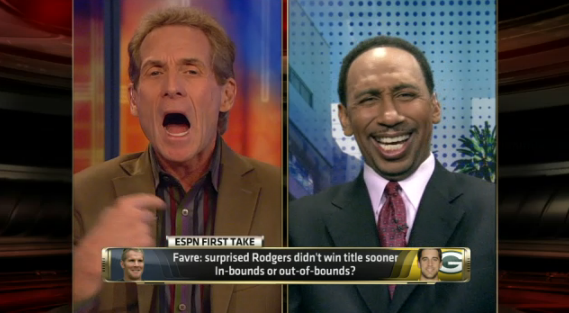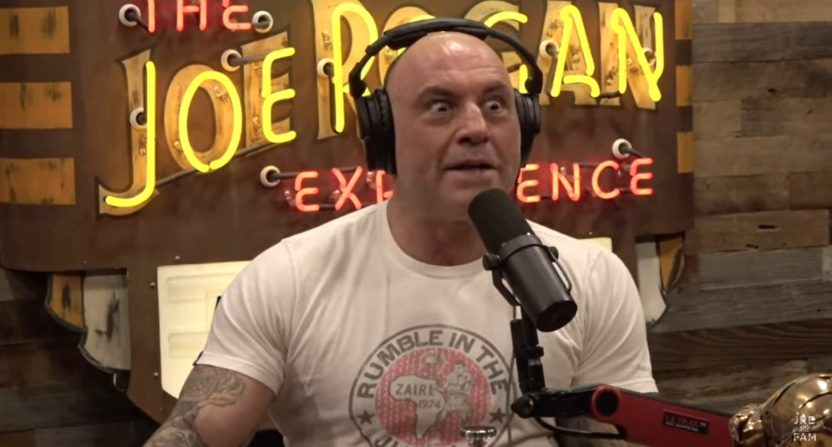It’s been said that sports are a mirror of society, but online debate culture–where volume, charisma, and follower counts trump expertise–is proving that instead of sports passively reflecting cultural trends, they’re shaping the way we communicate and actively transforming culture (and not necessarily for the better). Sports media has played an unhealthy role in making online debates into a sport of sorts, and there are severe consequences for this kind of cutthroat competition both inside and outside of the world of sports media. Sports aren’t a mirror–they’re a catalyst for shaping society, and all you have to do is take a look at social media to see how this dynamic is unfolding.
Earlier this month, podcaster Joe Rogan invited controversial lawyer and politician Robert F. Kennedy Jr. on The Joe Rogan Experience to discuss his thoughts on vaccine safety and his 2024 presidential run. Mind you, RFK Jr. is not a doctor, virologist, or medical professional of any sort, but Rogan allowed him to speak for over three hours on the alleged “dangers” of vaccines and wifi radiation–claims that have been debunked for years now. After the episode aired, Peter Hotez, who actually is a scientist and pediatrician, criticized the episode and faced a litany of online harassment for his valid critiques. Then, in a move that has become unsurprising at this point, Rogan tweeted: “Peter, if you claim what RFKjr is saying is ‘misinformation’ I am offering you $100,000.00 to the charity of your choice if you’re willing to debate him on my show with no time limit.”
Peter, if you claim what RFKjr is saying is “misinformation” I am offering you $100,000.00 to the charity of your choice if you’re willing to debate him on my show with no time limit. https://t.co/m0HxYek0GX
— Joe Rogan (@joerogan) June 17, 2023
Hotez, of course, declined. Competition, whether in debate, sports, or other areas of life, requires several things that cannot be present in a Hotez/RFK Jr. debate, the first of which is comparable skill. To ask Hoetz to debate RFK Jr. is the science equivalent of asking LeBron James to go one-on-one against a random high school basketball player–it’s not truly a competition. However, unlike the basketball analogy, which would more than likely be met with the understanding that James is so far out of the high schooler’s league that it would be borderline cruel to pair them up, Rogan’s challenge put Hotez in a tough position which he handled with far more grace than was owed for such a slap in the face to his expertise.
It’s frankly quite insulting to insist that a medical professional debate someone like RFK Jr. for clicks and likes, and yet, that has become so expected that Elon Musk tweeted that Hotez must be “afraid” of debating RFK Jr., a claim nearly as ludicrous as Rogan’s initial invitation. Hotez isn’t “scared” to debate RFK Jr. –he just has the common sense not to stoop to his level. And he had every right to turn it down, as offering RFK Jr. even more press and more of a chance to share his radical views to millions of people would do more harm than charity money would do good. Online debate culture ignores the fact that human lives are at risk when misinformation gets an undeserved platform.
But even when real human stakes are involved, a cease fire doesn’t make for exciting press in a culture where everything is a competition, and that’s just one of the reasons that the “sport” of online debate leeches away expertise from those who have rightfully earned it. Why get a degree when you can garner a million followers and say whatever the hell you want to an audience that freely offers you the gift of their trust? It’s much cheaper than a MD or a Ph. D (both of which Hotez has) and it sounds like a lot more fun. And it’s not a dynamic that is limited to vaccine debates or the Joe Rogan podcast space. Making online debates that lack credibility a “sport” cheapens debate as a format–even in the sports media space where competition is the bread and butter of the industry and where “debate me” culture has important roots and its own share of valid criticisms.
In March, sportswriter Dan Le Batard criticized Stephen A. Smith and Skip Bayless for the debate format that their show First Take helped popularize, stating “I hate what you two have done to sports television.” Then, fittingly, before Le Batard could explain why, Smith cut in, saying “How are we responsible for that? When our background is [in journalism]. Skip Bayless was a journalist for decades! I was a journalist for decades! We come on television and those ethics are applicable…When did it occur in my career that I ignored the journalistic tenets that came with the job?”

To Smith’s point, he and Skip Bayless do have the required credentials to discuss sports as they have for years. But Le Batard wasn’t taking a shot at their credentials. Rather, Le Batard claimed that he took no issue with the journalism involved in “made-for-TV” debate shows like First Take, but how it pales in comparison to the arguments spotlighted in such a format and how it has spawned a population of imitators in the online space today.
And for Smith to claim that he’s never ignored the journalistic tenants that come with his job in response is simply untrue and much of that can be attributed to the “made for TV” debate culture that Le Batard criticized Smith and Bayless for popularizing. There was Smith’s “debate” with Bayless in 2014 where he carelessly implied that women can be to blame for domestic violence in the wake of Ray Rice’s suspension or more recently, his emotional blow up over Kyrie Irving in an argument with Jay Williams on First Take.
Bayless, too, has had his fair share of thoughtless takes from claiming that Dallas Cowboys quarterback Dak Prescott’s public admission of his mental health struggles was a “weakness,” or taking cheap shots at NFL Hall of Famer Shannon Sharpe’s athletic career, implying that Sharpe believed Tom Brady wasn’t performing up to his normal standards in 2022 (a true statement) because Brady “won more games and played longer” than Sharpe did.
This trail of bad takes is disheartening from a journalistic standpoint, but it also shows that sports and society frequently overlap, and it’s disingenuous to say that athletes or sports media personalities should “stay in their lane” or “stick to sports,” so to speak. That’s precisely how Colin Kaepernick was blacklisted from the NFL for speaking out against police brutality and sparking much-needed conversations and doing important humanitarian work in the process.
Sports, politics, and culture overlap and intersect in complicated ways, whether it’s labor disputes between athletes and leagues, trans inclusion in sports, state and federal interference in the NIL space, or how a lack of abortion access impacts female athletes, and individuals in the sports industry have a right to voice their opinions on these and other highly contentious matters. However, it is not too much to ask of these people with their massive platforms to handle sensitive matters with sensitivity and due diligence–it’s the job of a seasoned journalist in any specialty to do so. To Le Batard’s point, online debate culture encourages the opposite: claim the hottest takes and raise the biggest ruckus on the most controversial issues to get the most likes and go viral. Research, facts, and logic are optional in spite of the high stakes.

The common thread running through all these examples in sports and culture are individuals with significant followings using massive platforms to debate what are bad takes at best and reckless misinformation at worst. And it doesn’t help when these personalities are in over their heads when it comes to the topics they jump to discuss, whether it’s vaccines, domestic violence, or mental health. But the entire concept of embracing debate is not for the sake of a good argument or to learn something new, but to win and be contrarian in the process. In fact, embracing outrage and hot takes has become a surefire way to kickstart the careers of many sports media personalities, including Smith and Bayless who are pioneers of debate
culture and the trend shows no signs of slowing down.
Take it from Rob Parker, a controversial Fox Sports host who recently spoke at USC’s annual “Broadcaster U” hosted by USC’s Annenberg School for Communication and taught NBA alumni some tricks of the trades when it comes to becoming a media star–including leaning into hot takes and “meme-able” arguments for the sake of drumming up controversy. “If we all agree that LeBron is the greatest player ever, what conversation are we having?” Parker asked his students. “Do you know what I mean? There’s nothing going on here, and no one’s going to watch it.”
The thing is though, that there’s nothing boring or wrong with having a conversation, in Parker’s words, about someone like LeBron James being the NBA GOAT and respectful conversations among experts can be wildly informative and entertaining while maintaining the dignity of all parties involved. If a take is uncontroversial, there’s no need to turn it into a fight, especially if taking a contrarian stance doesn’t make much sense, which Parker’s students attested to.
“I feel like a lot of guys try to do that so they could go viral or feel like they’re a bigger asset to whatever company they’re working with because it’s entertainment,” Will Barton told the New York Times after the summit. And he’s not wrong about today’s media climate inside and outside of sports media.
Although arguments about whether or not LeBron James is the GOAT of men’s basketball have a fairly low human cost–after all, nobody is going to be harmed by that kind of disagreement–the stakes run much higher when other societal dilemmas like vaccines, mental health or domestic violence enter the chat. And in sports media, they inevitably will. That’s why, when debates that lack credibility have become a sport where clicks, likes, and engagement are the main ends, nobody truly wins.







